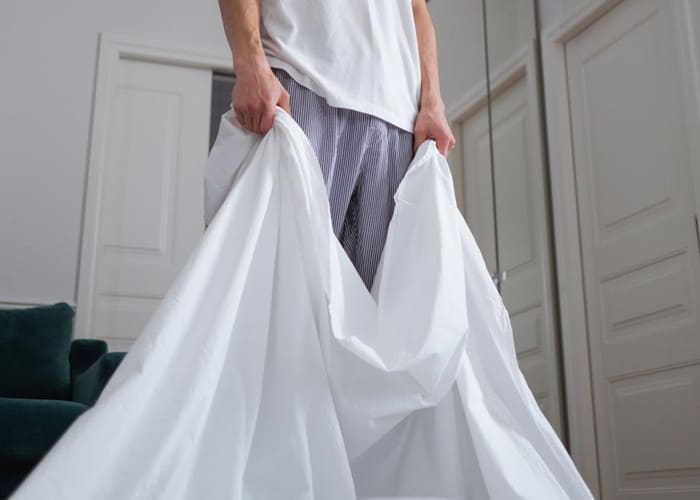When was the last time you changed your bedsheets? That’s the topic we will address in this article. Your sheets might be based on the design of your bedroom or the pattern of the fabric, but the best sheet is one that will last for a long time. Since you spend a third of your life in bed, assuming you get seven to nine hours of sleep each night. Therefore, sheets get used a lot and do need replacing.
But how often should you buy new sheets? Most experts recommend replacing your sheets every two to three years, so they remain of top quality. But the longevity depends on how you wash them, the quality of the fabric, and how often you circulate the sheets.
Factors Affecting Bed Sheet Durability
To find the perfect sheet that matches your style and bedroom decor, buying something that will last longer is essential.
Depending on how well you take care of your bedsheets and the quality of the fabric, you can expect them to last from one to twenty years. Generally, the following factors can affect the longevity of your sheets:
How often do you circulate your sheets?
Rotating your sheets is one way to elongate their lifespan. If you have several sets, it will take longer to buy another sheet because they will not face the same constant erosion that is subjected to one set with regular sleep-ins and washing.
How do you store the sheets?
Properly storing your bedsheets can also play an essential role in their longevity. You will enjoy your sheets for a long time if you know the best way to fold them. It doesn’t matter the type of materials used to make the sheets, be it satin, silk, cotton, or Tencel, here are a few tips to use for storing your bedsheets:
- Store your bed sheets in a cool, dry place
- Avoid storing them in sealed plastic bins as the trapped moisture could cause mildew.
- Make sure you line your storage place with acid-free tissue paper to avoid yellowing.
Your sheet washing habits
How you wash your sheets can also play a massive role in the longevity of your bedsheets. The best way to launder them is by using a washing machine once a week to prevent bed bugs and dust mites from camping in them. Dust mites tend to feast on dead skin cells, while bugs tend to live in warm, moist settings.
Don’t wait until you begin to develop skin irritation for you to start washing your sheets.
You should stick to washing your sheets once a week. You will sometimes be forced to wash them after every two weeks, especially if you don’t sweat a lot. But you tend to have night sweats, take morning showers instead of evening showers, sleep naked, and eat in bed.
Observing proper washing practices can help your bedsheets last longer. Thus you will not have to buy new sets more often.
There are a few things you need to keep in mind when washing your sheets, including:
- Water temperature: Most people think it is good to wash sheets at the hottest temperature to kill all the bacteria and germs. But high temperatures can shrink the sheets and cause colour fading, especially if it is the first wash.
- The label: Most beddings tend to come with directions from the manufacturer on how to wash them. Perhaps the best practice is following these instructions because the manufacturer knows what the best for the bedding material is.
Sometimes you will have to wash your beddings in high temperatures, like when you have just recovered from an infectious disease or during seasonal allergies.
Nevertheless, you still want to make some contingent measures to prevent your sheets from shrinking when washing them in the hottest setting. For instance, you can size them up.
Drying at the hottest temperature is not recommended, and you should be careful with bleaching. If you must use bleach on your light-coloured or white sheets, use the oxygenated kind rather than chlorinated ones because oxygen bleach tends to be less toxic compared to other alternatives and is gentler on the fibres of your sheets.
If possible, always line dry your sheets in the sun or tumble dry on low. Also, you should consider ironing them before storing them to kill any termites or bugs that may be habituating in your sheets.
Feature to look out for in new sheets
Picking bed sheets suitable for you can be a massive task if you don’t know what you are looking for.
But depending on your sleep preference, you should consider these sheets for your bed:
- Percale Sheets: These can be an ideal choice for hot summer nights. They are made from 100% cotton and feature a plain weave, which delivers an excellent al dente feel to alleviate your sleep.
- Sateen Sheets: These wrinkle-resistant sheets are more likely to bring a tad little of hygge to your life. They look stylish and ideal for the cooler months or those who tend to get chilly at night.
- Hyperlite Sheets: Don’t look any further than the Hyperlite Sheets if you look for cool sheets. They are made from 100% Tencel Lyocell woven in a grid pattern that helps you get quality sleep.
If you know what you want in a sheet, you can match these features to the thread count and fabrics to find the best sheet for your bed.
How to know if it is time to buy new sheets
When your current sheets are stained beyond redemption, if the edges are fraying, if the fabric has holes or is too thin, if the fabric is scratchy and rough, or if your beddings begin to release an unpleasant odour even after washing.

 Nectar Mattress
Nectar Mattress 


